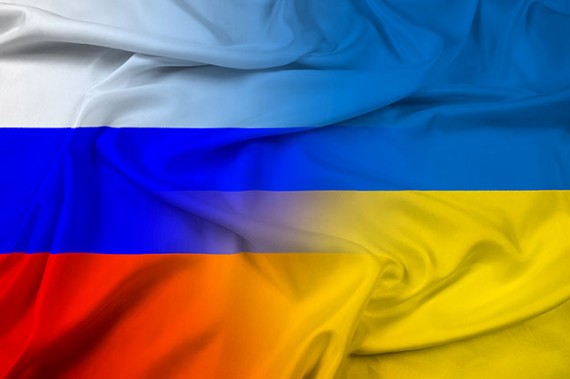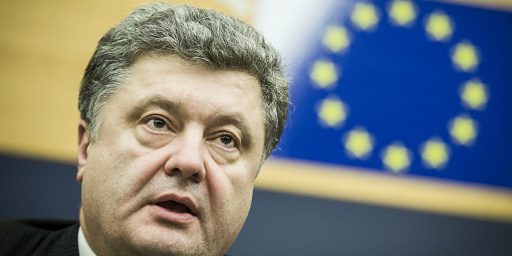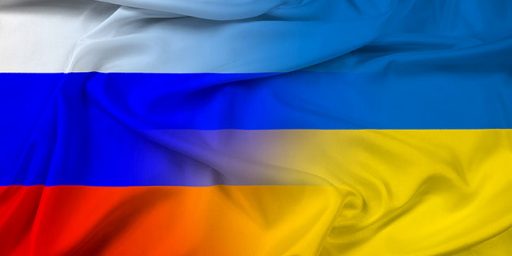Heavy Fighting Returns To Eastern Ukraine
The cease fire called by Ukrainian President Petro Poroshenko is officially over:
MOSCOW — Heavy fighting resumed in eastern Ukraine early Tuesday, including artillery shelling around the rebel-controlled city of Slovyansk, shortly after President Petro O. Poroshenko declared an end to a 10-day cease-fire and ordered government forces to renew their effort to squash the pro-Russian separatist insurrection in the east.
Mr. Poroshenko’s announcement, in a nationally televised statement after midnight, came on the heels of two consecutive days of conference calls with the leaders of Russia, France and Germany that failed to yield concrete steps toward a peace agreement. On Friday, European leaders issued an ultimatum to Russia, demanding it do more to end the violence caused by the rebels in eastern Ukraine. But attacks on government forces continued.
Dmytro Tymchuk, a military analyst close to the Ukrainian government, praised Mr. Poroshenko’s decision, saying that the one-sided adherence to the cease-fire by the Ukrainian military had only strengthened the rebel forces, allowing them to rearm and regroup.
“Every day the truce, whatever its political significance, provided tangible reinforcement to the terrorists from a military point of new,” Mr. Tymchuk wrote on Facebook, adding, “A longer truce period would give terrorists a chance to drastically increase their combat readiness.”
Mr. Tymchuk said that government forces had begun pounding rebels shortly after receiving Mr. Poroshenko’s new orders. “Air and artillery strikes are being carried out against all sites where there are terrorist strongholds and groups of terrorists are located,” he wrote.
In Kiev, the Parliament speaker, Oleksandr V. Turchynov, confirmed that Ukrainian forces were once again on the offensive against insurgents. “The active phase of the counterterrorism operation resumed in the morning,” he said, opening the day’s session. “Our armed forces are striking the bases and strongholds of the terrorists.”
Mr. Turchynov also said that Parliament was prepared to consider a request by Mr. Poroshenko to impose a state of emergency in the east, but that such a move toward martial law could only be made by the president.
The decision by Mr. Poroshenko to call off the cease-fire, while saying he still hoped to reach a truce in the coming days, reflected his conclusion that Russia was not genuinely working to bring the rebel forces under control even as President Vladimir V. Putin participated in conference calls and the Kremlin issued statements in support of a peace process.
Mr. Poroshenko’s decision also reflected a clear lack of confidence by the Ukrainian government that its European allies would follow through on threats of additional economic sanctions against Russia.
Given the fact that the pro-Russian separatists, and Russia itself, were not really honoring the cease fire, one can hardly fault Poroshenko for ending the one-sided cease fire. At the very least, the fact that the separatists are continuing to be able to engage strongly with the Ukrainian forces in the east would tend to put the lie to Russian claims that they are not involved in the matter. Where it goes from here, of course, is unclear. So far, it doesn’t seem like the sanctions that the U.S. and Europe have imposed on Russia have had any impact at all on Russian behavior, and they certainly don’t seem to be having any impact on the separatists themselves. If that continues, then one would expect to see the Ukrainians ramp up their offensive actions in the east, which may prompt the Russians to act.
There doesn’t seem to me to be an easy way out of this situation.





I’m not saying we should but…invade Iran?
It’s still the EU’s game to play, not ours.